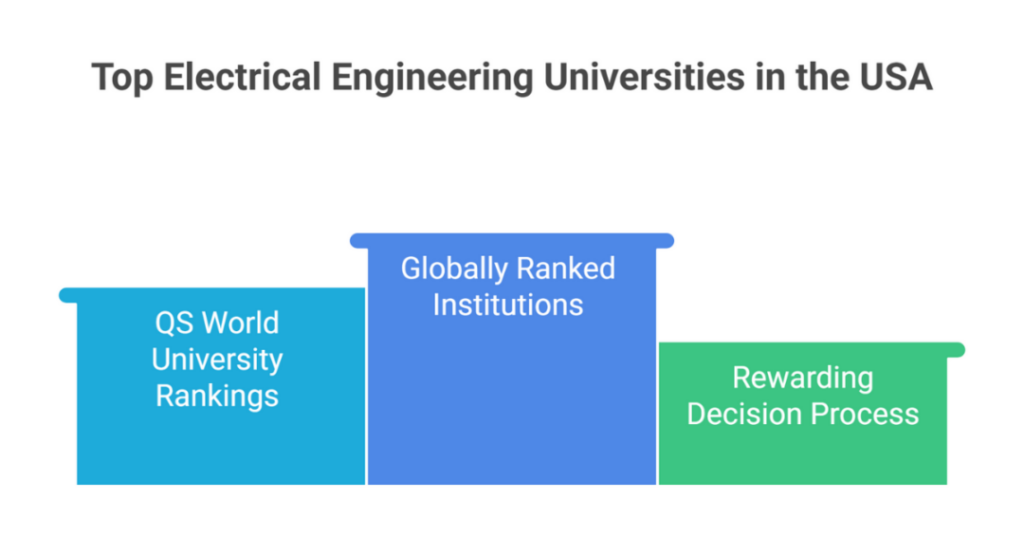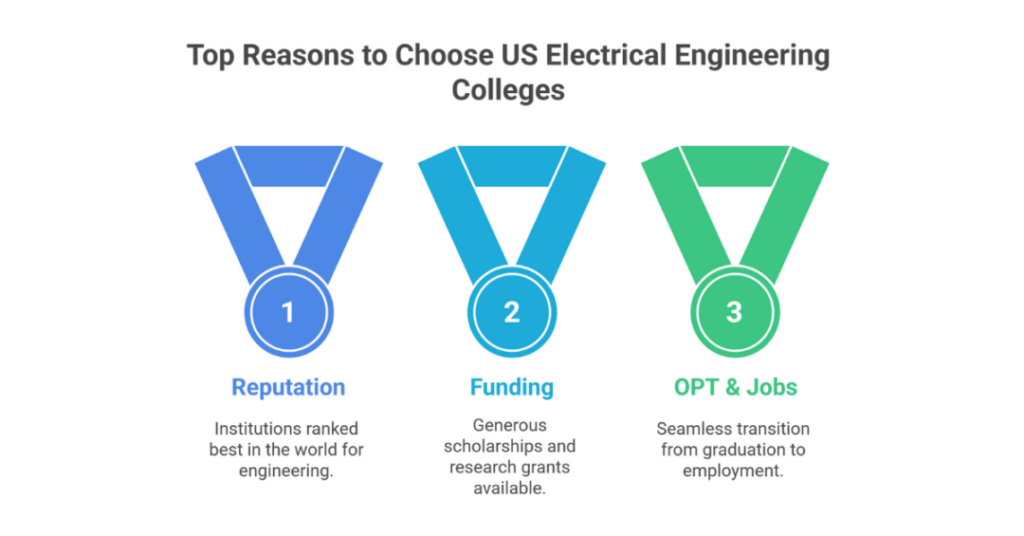28 July 2025
5 minutes read
Top 100 Universities in USA for Electrical Engineering for Indian Students (QS World University Rankings by Subject 2025)

Key Takeaways
- Top 100 universities in USA for electrical engineering provide world-class research, top-tier faculty, and strong global rankings in innovation and academia.
- Top 100 universities in USA for electrical engineering like MIT, Stanford, and UC Berkeley lead in interdisciplinary programs and career-ready graduate outcomes.
- Top 100 universities in USA for electrical engineering offer high ROI, OPT benefits, and scholarships that support both master’s and PhD-level international students.
Pursuing electrical engineering in the USA continues to attract Indian students, especially at globally ranked institutions. The 2025 QS World University Rankings by Subject shines a light on where top universities are positioned, making the decision process more transparent and rewarding.
Why Study MS in Electrical Engineering at Top Engineering Schools in USA?
Did you know the USA accounts for more than 40% of global innovation in electrical and electronic engineering?
Top engineering schools offer an edge:
- Strong academic research and hands-on project exposure
- High job openings post-graduation with OPT extension
- Globally recognised degrees and cutting-edge faculty

| Benefit | Description |
|---|---|
| Innovation | Access to leading universities in the world for engineering |
| Research | World-class labs and faculty support across broad subject areas |
| Employment | Excellent job prospects in electrical and electronic sectors |
What are the Top Universities for Masters Courses in Electrical Engineering in USA?
An interesting fact: MIT began its electrical engineering program in 1882, making it one of the oldest choices available!
1. Harvard University
Harvard University has one of the country’s top electrical and electronic engineering programs. To be accepted, students need to submit GRE, a TOEFL or IELTS score, GPA, a personal statement, and transcripts.
A complete resume and good letters of recommendation is required. Many programs will have it interdisciplinary conveniently crossing computer science and mathematics.
2. Stanford University
Stanford holds a top 10 position in electrical engineering in the USA. The application process requires GRE, GPA, resume, transcript, statement of purpose, and recommendation letters.
The program is convinced to make students critically think about the concepts, providing a higher level of learning with courses/categories that include topics such as aerospace systems, electronic circuits, and AI-powered engineering courses.
3. University of Central Florida
UCF offers one of the most affordable electrical engineering programs available. It offers a MS in electrical engineering with a strong emphasis on learning by doing/student research.
For educational purposes, students need items like TOEFL/IELTS scores, a statement of purpose, GPA, and GRE. Students from other countries will also be able to access and apply for scholarship opportunities.
4. Drexel University
Drexel’s College of Engineering emphasizes full-time, co-op based programs. International students require SOP, transcript, GPA, GRE, TOEFL/IELTS, resume, and letters of recommendation.
Its electronic engineering curriculum includes embedded systems and computer science integration.
5. Massachusetts Institute of Technology
MIT continues to dominate QS World University Rankings by Subject 2025. Applicants need stellar GPA, GRE scores, transcripts, letters of recommendation, and a personal statement. The institution is globally revered for its engineering school and graduate electrical programs.
Why Pursue Admission in the Best Electrical Engineering Colleges in USA?
Surprise: Over 25 US institutions are among the top 50 in the world for engineering!
- Unmatched faculty-to-student ratio in top universities
- Highly ranked engineering programs across QS, THE, and Times Higher Education
- Access to cutting-edge research and interdisciplinary learning

| Feature | Reason to Choose |
| Reputation | Institutions ranked best in the world for engineering |
| Funding | Generous scholarships and research grants |
| OPT & Jobs | Seamless transition from graduation to employment |
Top 100 Universities in USA for Electrical Engineering
Guess what? Over 30 American universities dominate the global top 100 for electrical engineering, outshining other countries by a wide margin.
Here’s a carefully curated table featuring 10 QS 2025 ranked U.S. universities followed by 90 highly regarded institutions based on reputation and performance:
| Rank | University |
| 1 | Massachusetts Institute of Technology (MIT)– Cambridge |
| 2 | Stanford University |
| 3 | University of California, Berkeley |
| 4 | California Institute of Technology (Caltech) |
| 5 | Harvard University |
| 6 | Georgia Institute of Technology |
| 7 | University of Illinois Urbana-Champaign |
| 8 | University of Michigan |
| 9 | Carnegie Mellon University |
| 10 | Princeton University |
| 11 | Purdue University |
| 12 | University of Texas at Austin |
| 13 | University of California, Los Angeles (UCLA) |
| 14 | University of California, San Diego |
| 15 | Texas A&M University |
| 16 | Columbia University |
| 17 | University of Southern California |
| 18 | Cornell University |
| 19 | Northwestern University |
| 20 | University of Florida |
| 21 | University of Washington |
| 22 | Ohio State University |
| 23 | Pennsylvania State University |
| 24 | University of Minnesota |
| 25 | University of Wisconsin-Madison |
| 26 | University of Maryland |
| 27 | Boston University |
| 28 | North Carolina State University |
| 29 | Rice University |
| 30 | University of Virginia |
| 31 | Arizona State University |
| 32 | Rensselaer Polytechnic Institute |
| 33 | University of California, Davis |
| 34 | University of Colorado Boulder |
| 35 | Vanderbilt University |
| 36 | Michigan State University |
| 37 | University of Notre Dame |
| 38 | Iowa State University |
| 39 | University of Arizona |
| 40 | Virginia Tech |
| 41 | Rutgers University |
| 42 | Washington University in St. Louis |
| 43 | University at Buffalo |
| 44 | University of Central Florida |
| 45 | University of Massachusetts Amherst |
| 46 | Drexel University |
| 47 | Syracuse University |
| 48 | George Washington University |
| 49 | Lehigh University |
| 50 | Colorado School of Mines |
| 51 | Oregon State University |
| 52 | Kansas State University |
| 53 | University of Delaware |
| 54 | University of Houston |
| 55 | Auburn University |
| 56 | Missouri University of Science & Technology |
| 57 | Clemson University |
| 58 | University of Kansas |
| 59 | Northeastern University |
| 60 | Stevens Institute of Technology |
| 61 | Illinois Institute of Technology |
| 62 | San Diego State University |
| 63 | Southern Methodist University |
| 64 | New York University (NYU) |
| 65 | University of Connecticut |
| 66 | Baylor University |
| 67 | Louisiana State University |
| 68 | Oklahoma State University |
| 69 | University of Alabama |
| 70 | Florida State University |
| 71 | University of New Mexico |
| 72 | University of South Florida |
| 73 | Temple University |
| 74 | University of Nevada, Reno |
| 75 | Texas Tech University |
| 76 | University of Missouri |
| 77 | San Jose State University |
| 78 | Portland State University |
| 79 | University of Idaho |
| 80 | Boise State University |
| 81 | University of North Texas |
| 82 | University of Louisville |
| 83 | University of Mississippi |
| 84 | Wichita State University |
| 85 | Montana State University |
| 86 | University of Arkansas |
| 87 | West Virginia University |
| 88 | University of Oklahoma |
| 89 | University of Maine |
| 90 | Northern Arizona University |
| 91 | East Carolina University |
| 92 | University of Toledo |
| 93 | University of New Hampshire |
| 94 | Utah State University |
| 95 | University of Alaska Fairbanks |
| 96 | South Dakota State University |
| 97 | North Dakota State University |
| 98 | University of Rhode Island |
| 99 | University of Vermont |
| 100 | Marshall University |
Fees, Scholarship Eligibility and Salary After Undergraduate, Masters and PhD in Mechanical and Electrical Engineering
Here’s a fact: Electrical engineering graduates from top US institutions enjoy average salaries exceeding $100,000 annually.
- Tuition fee varies across institution, program, and degree type
- Aid available for both undergraduate and graduate-programs
- PhD scholars often receive stipends, full tuition waivers, and research assistant roles
| Degree | Average Tuition (Annual) | Scholarship-Availability | Average Salary (Annual) |
| Bachelor’s Degree | $35,000 – $55,000 | Moderate | $70,000 – $85,000 |
| Master’s Degree | $40,000 – $65,000 | High | $90,000 – $115,000 |
| PhD | Fully Funded Often | Very High | $110,000+ |
Conclusion
Choosing one among the top 100 universities in USA for electrical engineering is a gateway to an exceptional academic and professional future.
From bachelor’s to PhD, top universities ensure world-class education, advanced engineering programs, and career readiness. Want personalised help with your admission process?
For support and statistics, reach out to Ambitio today and begin your journey with expert guidance!
FAQs
What are the admission requirements for the top 100 universities in USA for electrical engineering?
The top 100 universities in USA for electrical engineering typically require a strong GPA, GRE scores, letters of recommendation, transcripts, and a statement of purpose for graduate-level admissions.
How can Indian students apply to the top 100 universities in USA for electrical engineering?
To apply to the top 100 universities in USA for electrical engineering, Indian students must prepare strong academic profiles and submit online applications. Many top 100 universities in USA for electrical engineering also require supporting documents like SOPs and LORs.
Do the top 100 universities in USA for electrical engineering offer scholarships for international students?
Yes, the top 100 universities in USA for electrical engineering offer various scholarships and assistantships. Scholarships at the top 100 universities in USA for electrical engineering include merit-based, research, and need-based funding.
What is the average tuition fee at the top 100 universities in USA for electrical engineering?
The average annual tuition fee at the top 100 universities in USA for electrical engineering ranges between $35,000 to $65,000, depending on the institution and program level.
Which exams are accepted by the top 100 universities in USA for electrical engineering?
Most of the top 100 universities in USA for electrical engineering accept GRE for master’s and TOEFL or IELTS for English proficiency, while some may also consider GMAT or SAT scores.
What career opportunities follow graduation from the top 100 universities in USA for electrical engineering?
Graduates from the top 100 universities in USA for electrical engineering secure high-paying roles in power systems, VLSI, robotics, and AI with top recruiters offering OPT and H-1B pathways.
Are the top 100 universities in USA for electrical engineering recognized globally?
Yes, the top 100 universities in USA for electrical engineering are globally recognized for excellence in research, academic output, and industry partnerships in the engineering domain.

You can study at top universities worldwide!
Get expert tips and tricks to get into top universities with a free expert session.
Book Your Free 30-Minute Session Now! Book a call now




























